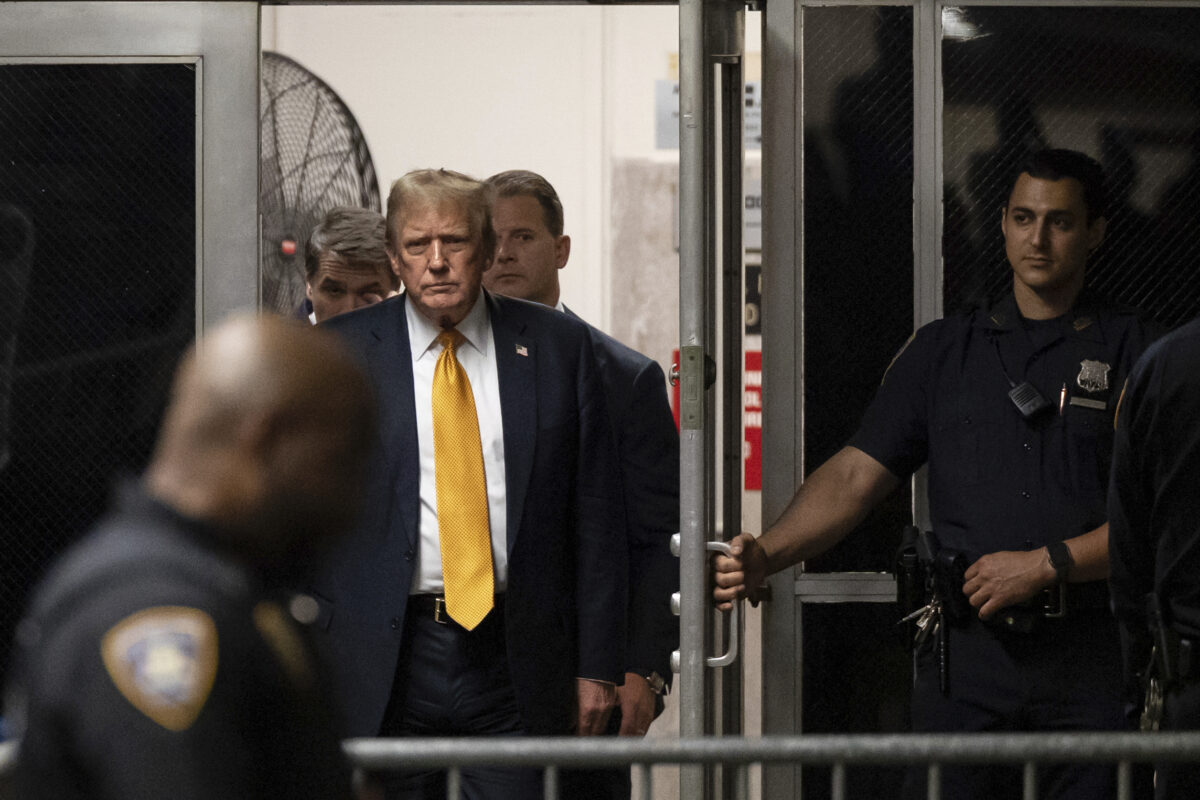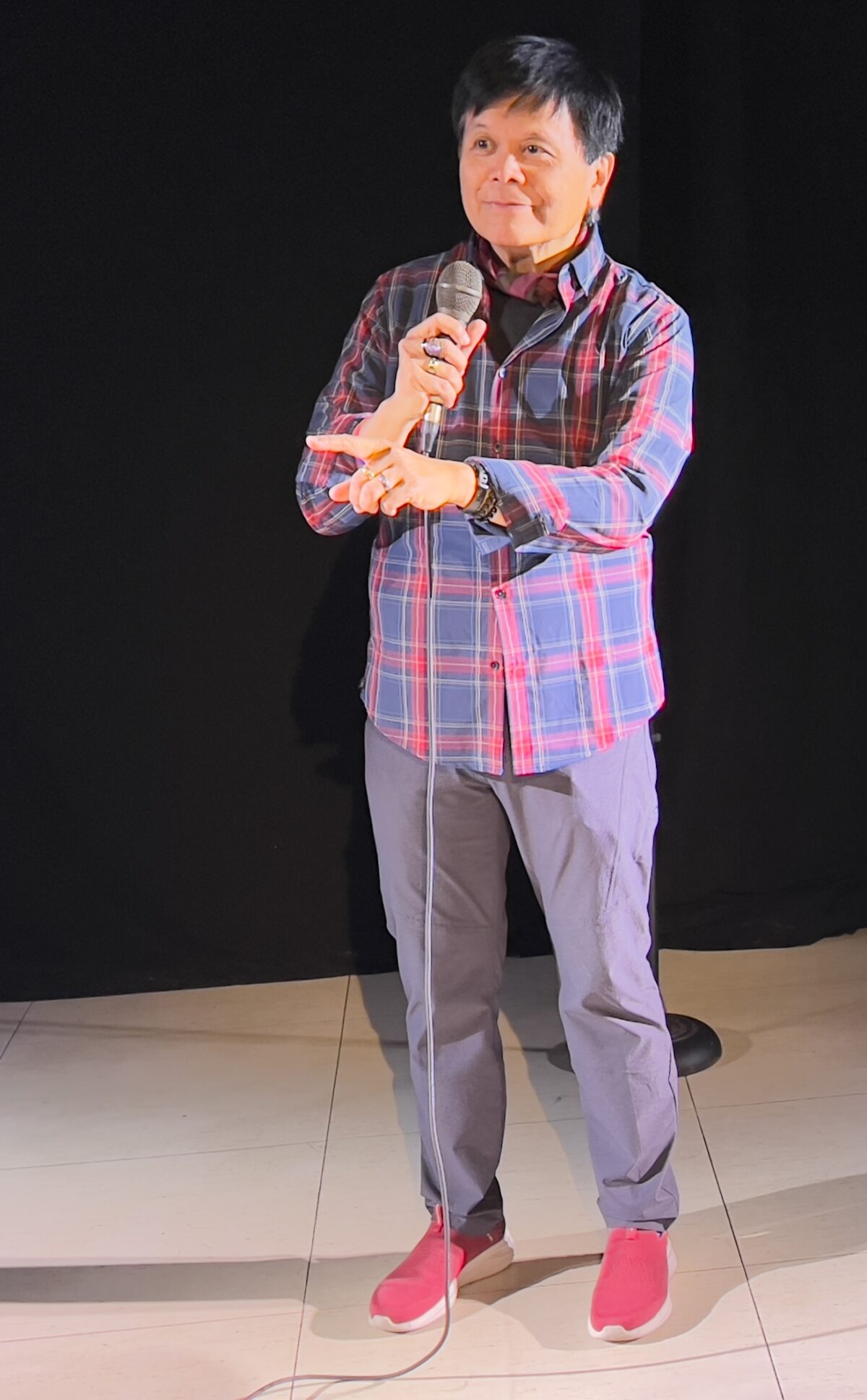Swapping stories in Florida, waiting for Trump hush money trial verdict

Former President Donald Trump walks to the courtroom for his hush money trial at Manhattan criminal court, Wednesday, May 29, 2024, in New York. (Yuki Iwamura/Pool Photo via AP)
When I met Nicole Persley she was looking for a show to see at the Orlando Fringe Festival.
I told her I did a show about history.
“I’m into history,” she said.
I was in Florida this past Memorial Day weekend, performing my play, “Emil Amok, Lost NPR Host…” an examination of how my father’s life as a colonized Filipino in America impacted my life and my self-image.
In the play, there’s a story I tell about growing up in San Francisco’s segregated public schools in the 1960s. A lone black kid was bussed in to desegregate, and my white friends responded by chasing him around the school yard.
After the boy left and vowed to return with his gang, I walked with my friends after school to our neighborhood and asked aloud, “I don’t know why those black guys hate us white guys.”
My friends set me straight.

Inquirer.net USA columnist Emil Guillermo performs in his one-man show, “Emil Amok, Lost NPR Host, Wiley Filipino, Vegan Transdad” in Florida. CONTRIBUTED
They told me I was the color of Pooh. Winnie the Pooh. Not white, just some kind of dark person, light enough to be their friend.
I remember that moment to this day.
Persley, a light skinned African American woman and an artist, was struck by the story.
“You know about color,” she told me.
So does she.
And after I told the audience my story, she told me hers.
Growing up in Virginia, Persley thought for years she was white. Her mother was. And her father appeared to be too. She wasn’t “passing,” she just didn’t know her history. Neither did her father who was just a teenager when his father (Nicole’s grandfather) died.
It was while in college at the University of Michigan Nicole discovered the history of her paternal grandfather. Through genealogical research and DNA testing, Persley learned the truth about Alonzo Bond Persley, Sr., a light skinned African American, who grew up in Macon, Georgia. He attended the University of Michigan Medical School and graduated in 1915, the president of Alpha Pi Alpha fraternity. As an undergraduate, he attended nearby Lincoln University, an HBCU, and lived in a traditional black area. There’s no doubt, he wasn’t “passing.” He graduated medical school as a proud African American doctor.
The information was revelatory. Nicole realized she was not white and embraced her black history, which is rich and includes her great uncle, Louis H. Persley, the first registered African American architect in Georgia. He was recruited by Booker T. Washington to be part of the faculty and help build and design Tuskegee’s original campus.
Both of them served in World War I, which meant they held a special place in her heart Memorial Day weekend.
But it’s her grandfather’s story that means something to her. She sees the history as suppressed from her and now acknowledges how her grandfather’s light skin enabled him “to pass.”
“It was something that was necessary for him to survive due to the laws and Jim Crow policies that prevented him from being a physician,” she said in an interview with the International African American Museum.
Persley’s reaction to my show was different from the mostly white audiences I encountered in Orlando. Stories enable our empathy and help us realize we have shared pain and struggles. Asians, Filipinos, African Americans.
We have much in common when we hear and understand each other’s American story.
When we swap stories, we can all go forward together.
Waiting for the jury to speak
And now you know why you should take jury duty seriously.
If you’ve been paying attention to the Trump trial in the news, the jury is the most important part of our justice system.
It all boils down to story.
Whose do you believe?
The prosecution has a ton of evidence, documents and checks signed by Trump, that show these weren’t “legal fees.” They were reimbursements made to Michael Cohen who borrowed against his home to buy off Stormy Daniels’ silence. It was done just weeks before the 2016 election so that the story wouldn’t hurt Trump’s presidential run. There’s your motive.
And the crime. Not only does it show election interference, but the $130,000 paid to Daniels qualifies as a campaign donation, well in excess of annual limits by individuals.
David Pecker, then of the National Enquirer, said the scheme was a strategy of the campaign to “catch and kill” such stories.
And then there’s the testimony of Trump loyalist, Hope Hicks, who cried during her testimony when she said Trump told her he knew about the arrangements, called “legal fees” but were in fact money to cover up the payments to Daniels.
That’s what’s important. The prosecution took almost four hours on Tuesday to close its case.
The defense spent most of their time calling the prosecution’s star witness Cohen a liar.
But that’s an irrelevancy in a trial of scoundrels. As the prosecution pointed out, who is Cohen but the man Trump picked Cohen to do his dirty work. The evidence seems weighted toward conviction.
The jury now has the case and we could have a convicted former president by the weekend.
The first ever. Historical, in the most negative way.
If so, Trump will certainly appeal.
But will people want a former president who is essentially damaged goods as the leader of the free world?
No matter what happens, we’re all better off leaving Trump in the past. He’s not a leader. He’s a man with serious legal issues even beyond this case. The jury will tell us their verdict, but voters should have enough info by now. Trump’s simply unfit for an encore performance in the White House.
Emil Guillermo is a journalist, commentator and storytelling monologist. He writes a column for Inquirer.net’s US Channel. Contact him at www.amok.com

